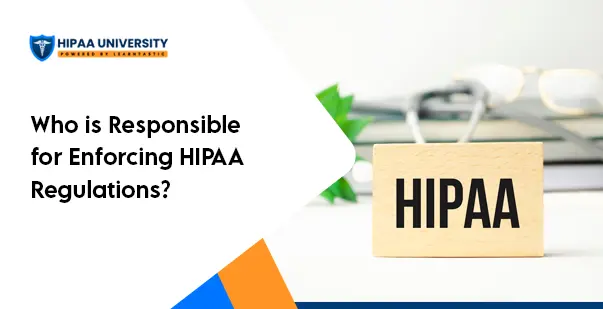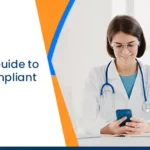Who is Responsible for Enforcing HIPAA Regulations?

September 3, 2024
Table of Contents:
- Introduction
- What is HIPAA?
- Why is HIPAA important?
- Who enforces HIPAA?
- The Role of the U.S. Department of Health and Human Services (HHS)
- Other HHS Divisions Involved in HIPAA Enforcement
- Penalties for Non-Compliance
- Take Action to Secure Patient Privacy
Introduction
There is often confusion about who enforces HIPAA regulations. HIPAA, the Health Insurance Portability and Accountability Act, sets strict standards for the protection of patient information. However, understanding which entities oversee and enforce these rules can be unclear.
Various organizations within the U.S. government are responsible, including the Office for Civil Rights (OCR) within the Department of Health and Human Services (HHS). Additionally, other bodies, such as the Centers for Medicare & Medicaid Services (CMS) and state attorneys general, play roles in enforcement.
This is where confusion often arises. In this blog, we’ll explore who is responsible for HIPAA enforcement and what their roles involve.
What is HIPAA?
HIPAA, or the Health Insurance Portability and Accountability Act of 1996, is a federal law that safeguards the privacy of protected health information (PHI). It ensures that sensitive PHI is not disclosed to unauthorized entities, including healthcare plans, providers, clearinghouses, and business associates. The U.S. Department of Health and Human Services (HHS) issues privacy rules to enforce HIPAA’s requirements.
HIPAA regulations are constantly evolving to keep up with changes in the healthcare industry. With the rise of electronic health records (EHRs), healthcare professionals have become more reliant on digital tools like mobile apps, social media, and email for communication.
To address these changes, the Health Information Technology for Economic and Clinical Health (HITECH) Act was passed as part of the American Recovery and Reinvestment Act of 2009. HITECH was enacted to promote the adoption and proper use of health information technology. It also strengthened HIPAA’s security and privacy protections by increasing enforcement and legal liability.
Why is HIPAA Important?
HIPAA is vital for keeping patient information safe. It protects a wide range of data, including personal and medical details. HIPAA goes beyond legal obligations; it reflects an ethical duty to protect patients. By following HIPAA, healthcare providers ensure that patient information remains confidential and secure.
- HIPAA requires the protection of patient health information, including past, present, and future physical and mental health issues, diagnosis results, and the care they receive.
- It also covers personal details like the patient’s name, social security number, address, identity, medical history, and payment methods.
- Sharing this sensitive data with unauthorized individuals can cause harm.
- HIPAA ensures patients receive protection and quality care. It emphasizes not just legal duties but also the ethical duty to cause no harm.
Also Read: What Is The Purpose of HIPAA in 2024?
HIPAA Rules: All You Need to Know
There are several rules under HIPAA that healthcare providers and related entities must follow to protect patient health information. Understanding these rules is crucial for compliance and safeguarding patient data.
-
The Privacy Rule
The HIPAA Privacy Rule establishes standards for protecting patients’ medical records and Protected Health Information (PHI). This rule sets limitations and boundaries on the use and disclosure of personal information without the patient’s consent. The Privacy Rule gives patients more control over their information, including the right to request a copy of their health records and make corrections.
-
The Security Rule
The Security Rule is one of the most important for HIPAA compliance. It covers physical, administrative, and technical safeguards to ensure the confidentiality, security, and integrity of electronic Protected Health Information (ePHI). The Security Rule also requires employee training, risk analysis and management, access control, data encryption, and audits. The rule allows providers to tailor security measures based on their size, complexity, and capabilities. This flexibility is particularly beneficial for small health organizations that may not need as rigid or complex protections as larger healthcare enterprises.
-
The Breach of Notification Rule
The Breach Notification Rule requires covered entities to promptly inform patients when there is a breach of protected health information (PHI). They must also notify the OCR and the media if a breach affects more than five hundred patients. Healthcare providers are expected to follow HIPAA compliance regulations to communicate with affected patients about breaches without undue delay. Affected individuals must be informed in advance so they can protect themselves from potential harm, understand how the organization is involved in the breach investigation, and learn how to avoid other security mishaps in the future.
-
The HIPAA Enforcement Rule
The HIPAA Enforcement Rule, added to federal regulations in 2006, clarifies the penalties for violating HIPAA. The Enforcement Rule imposes stricter civil fines for HIPAA violations. Most HIPAA violations result from accidents or unintentional mistakes, but the rule includes steep criminal charges and fines for willful negligence or deliberate misuse or theft of patient information. The primary goal of the HIPAA Enforcement Rule is to encourage medical organizations to take HIPAA regulations more seriously by imposing the threat of criminal charges and hefty fines.
Who Enforces HIPAA?
Are you wondering who is responsible for implementing and monitoring the HIPAA regulations? Well, the Office for Civil Rights (OCR), a division of the U.S. Department of Health and Human Services (HHS), is the primary entity responsible for enforcing HIPAA guidelines.
However, what agency enforces HIPAA was not clearly defined until 2006, when the HHS department issued the HIPAA Privacy Rule, also known as the Enforcement Final Rule of 2006. While OCR handles most of the enforcement, it is not the only entity responsible for enforcing HIPAA rules.
State Attorneys General and the Centers for Medicare & Medicaid Services (CMS) also have the authority to enforce HIPAA’s administrative regulations.
The Role of the U.S. Department of Health and Human Services (HHS)
The Department of Health and Human Services (HHS) plays a crucial role in the enactment and enforcement of HIPAA regulations, which are designed to protect patient privacy and secure health information.
- HHS’s mission includes a wide range of health-related responsibilities, including the enforcement of HIPAA regulations.
- HHS, through its Office for Civil Rights (OCR), is responsible for the primary enforcement of HIPAA.
The Role of the Office for Civil Rights (OCR)
The Office for Civil Rights (OCR) is responsible for ensuring that civil rights laws are followed. This office works to protect individuals from discrimination and ensure that everyone has equal access to opportunities. Let’s look at the key roles the OCR plays in achieving these important goals.
- Complaint Investigations: The OCR investigates complaints from individuals who believe their HIPAA rights have been violated. This includes cases of unauthorized sharing of Protected Health Information (PHI), inadequate safeguards, or failure to provide access to records.
- Compliance Reviews: The OCR conducts reviews of covered entities, such as healthcare plans, providers, clearinghouses, and business associates, to ensure they comply with HIPAA regulations.
- Enforcement Actions: If the OCR finds HIPAA violations, it can impose fines, enforce corrective action plans, and, in some cases, refer matters for criminal prosecution. The OCR also works with entities to resolve issues through corrective actions or voluntary compliance.
- Compliance Audits: The OCR conducts audits to assess whether covered entities and business associates comply with HIPAA regulations. These audits help identify gaps and ensure the protection of health information.
Other HHS Divisions Involved in HIPAA Enforcement
While the OCR handles most enforcement, other HHS divisions, such as the Centers for Medicare & Medicaid Services (CMS) and State Attorneys General, also play important roles. These groups help ensure that patients have more control over their Protected Health Information (PHI).
The Role of the Centers for Medicare & Medicaid Services (CMS)
CMS enforces the HIPAA Administrative Simplification Regulations, which aim to improve healthcare efficiency. CMS investigates cases where covered entities fail to comply with HIPAA rules. However, CMS does not impose penalties if the entities work towards compliance.
The Role of State Attorneys General
The HITECH Act of 2009 granted state attorneys general the authority to enforce HIPAA when patients’ confidential medical data is breached within their states. This act allows them to take civil action in federal courts, with a maximum fine of $25,000 per violation category per year, which is less than the fines imposed by the OCR.
Although there are multiple ways to enforce HIPAA compliance, it is not always clear which agency should handle enforcement in a given situation. Generally, the OCR is primarily responsible for taking action against patient information breaches. However, the CMS and FDA also have enforcement power, and more recently, the FCC has been granted HIPAA regulation enforcement authority. Finally, the HITECH Act has empowered state attorneys general to prosecute specific violations within their states.
Also Read: What is HIPAA Certification?
Penalties for Non-Compliance
Penalties for HIPAA violations vary depending on the nature of the violation and whether an individual or an organization committed it:
- Fines for civil violations can range from $1,000 to $50,000 per violation, depending on the severity of the offense.
- If a company willfully violates HIPAA but corrects the issue within the required timeframe, the fine may be up to $50,000 per violation.
- Fines can reach up to $1.5 million in cases where a company engages in willful misconduct and fails to correct the issue.
- For criminal violations, penalties can include prison sentences ranging from 1 to 10 years, depending on the seriousness of the offense.
Take Action to Secure Patient Privacy
Hopefully, you now have a better understanding of who enforces HIPAA! To learn more about HIPAA compliance and enforcement, consider enrolling in a HIPAA course. This course will equip you with the knowledge necessary to ensure patient privacy is protected at all levels of your organization. Taking this step will help safeguard your patients’ rights and trust. Get certified today with HIPAA courses.





